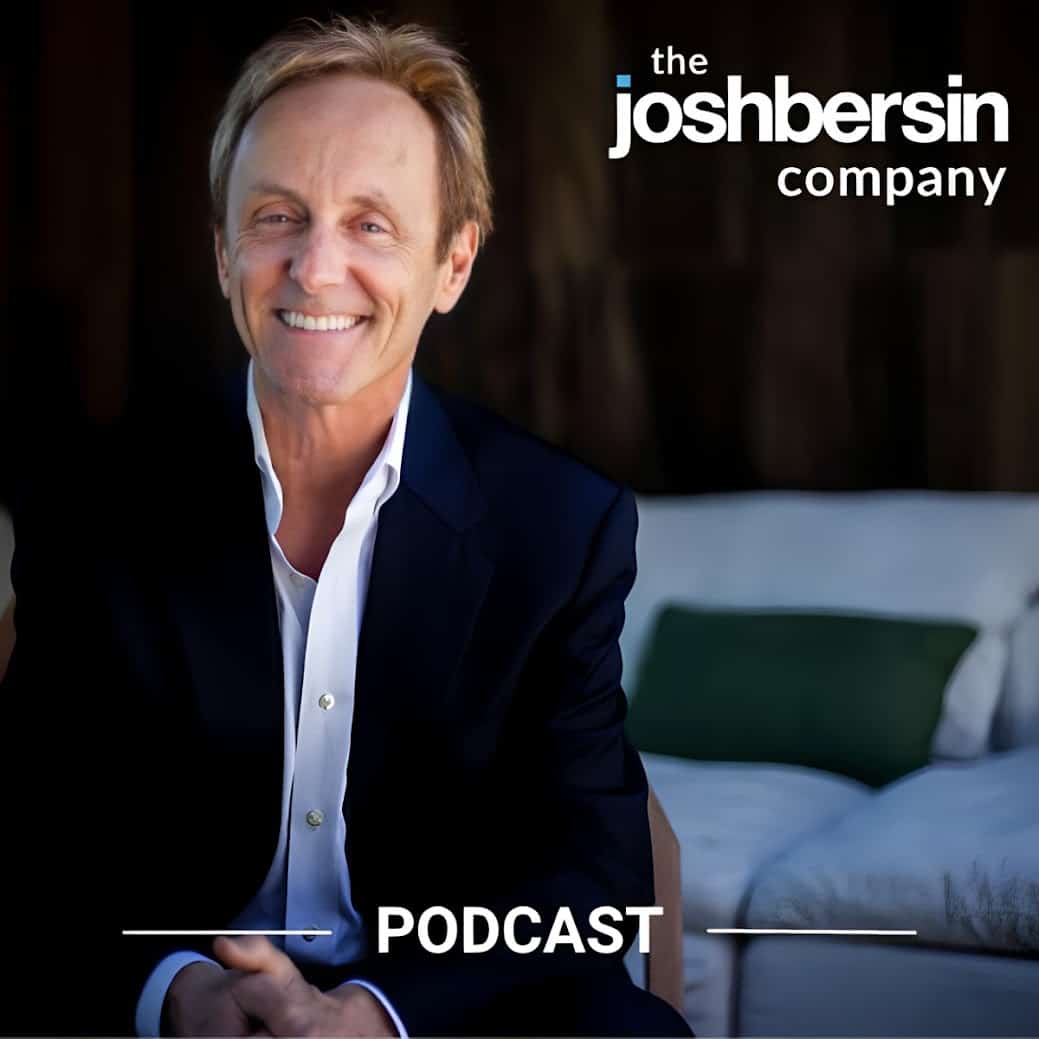Episode Transcript
[00:00:01] Good morning everybody. Today I want to talk about the HR career Navigator that we launched this week and the HR tech market a bit since we're entering HR tech season now that the summer is coming to an end. So we launched this week a really exciting offering for you as HR professionals where we've taken all of the information that we've captured over the last several years about HR job titles, skills and our capability model. And we've loaded into Eightfold to build a career planning and career navigation system for you. And basically what you can do is upload your LinkedIn resume, fill it in with your experiences and your credentials, and it will show you a series of career paths that you can traverse along with the skills that you need and all of the training and development from the Joshua Academy to get you there. And it will connect you to individuals who've offered to become career coaches for you in those developmental experiences. So you can reach out to those people and say, I'm interested in becoming a clo. I'd love to talk to you about your career. And if they volunteered to be open to that, there you go, you've found them. We have built this in partnership with Eightfold. Eightfold's engine is AI powered, so it can update the skills of HR on a regular basis. So as new skills are needed and HR evolves and expands, which it does, the skills in the system will continuously be updated and of course, all of the content in the Josh Versen Academy is in there. And you just have to license the JBA if you want to go into those courses. And that will be updated on a regular basis too. So we think it's an incredible tool. Now, why is it important? Obviously it's great for you and HR, but there's more to it than that. And that is for transformation. HR transformation is going on everywhere, every company we talk to. And it's not a transformation of implementing any new ERP. This is shifting the HR function from that of a cost center service delivery operation or what I call fulfillment center to a strategic consulting problem solving insights organization that can help the company with productivity, with internal mobility, with restructuring, with transformation, with pay and diversity problems, with labor market issues, with recruiting, all of that stuff. That sea level, top line, really strategic, should be strongly owned and facilitated by a strategic HR function. And it turns out a lot of companies don't think that way. A lot of companies still have CHros or HR departments that are measured as cost centers and they're very bureaucratic. And there's lots of people in lots of roles. Business partners are not always aligned or trained well and the CoEs are oftentimes either distributed or overstaffed or under technology enabled. And so it's complex. And what we find when we go through this with companies and we show them what the systemic operating model looks like, the number one thing they say we don't have the HR skills to do what you're telling us we need to do. So we're basically sitting in a profession that has under skilled itself and that is the reason we built the navigator. As I talked about in the launch article, I really think the way most of us learn how to do HR is by stumbling across new opportunities, trying new things, getting projects, changing jobs, looking for a mentor. It's very haphazard, which is great, that's the way the world works. But we need to push harder. And that's why the career navigator is such a strategic offering. It's so important and it is coupled with the Josh Fersen Academy, it's going to help you transform your career, your team and your HR function. And we've seen this in dozens and dozens of companies that have worked with us on all of our HR professional development services and content.
[00:04:17] Okay, that's a little bit about that. And by the way, we worked with Eightfold on that. So we have a very powerful AI engine under the covers and I have a lot of confidence that month by month, year by year, that thing is going to get better and better and better.
[00:04:31] Number two, the tech market. So we're entering the season of HR technology conference, the unleashed conference, the workday rising conference. Amazing things are happening. The sans are shifting.
[00:04:44] I'm just finished a 4000 word briefing on what's happening for 2025 that'll be available in late September, early October.
[00:04:54] But let me give you just a little bit of sense here. The HR tech market, as I talked about in an article that just came out in Business Insider, is like a kitchen drawer. There's a lot of stuff in there and you can't have clean it out without somebody saying, wait a minute, I'm using that tool, you can't get rid of it. And we will always be living in systems and companies where we have lots and lots of HR tools. So you're going to be in the vendor selection business for the rest of your career. So how do you make sense of these vendors? How do you evaluate them? How do you decide who to work with? I would suggest as we get into this market that there's three big things. Number one, the product is the product feature rich and capable of doing what you need it to do. That's going to take an RFP, it's going to take some demos, it's going to take some prototype testing, you're going to have to show it to some users and you're going to have to evaluate if this company that you're doing business with is solid enough as a technology provider, as a designer, as an implementer, to give you a system that does the product features that you need. And there are going to be things missing and there are going to be things that aren't perfect, but they're to some degree, product due diligence is number one. And that is what companies usually do first is they evaluate the product. Now part of evaluating the product is evaluating who the product was designed for. Because if you're a global bank and you're buying a product that was designed for manufacturers or healthcare companies, I could be pretty sure that that thing probably won't do everything you want it to do. So as part of that product analysis, you do have to look at who the customers are, what use cases they have implemented, what size they are, what geography they are, what industry they're in, what industry features they've built and therefore where is the company going to put its R and D. You can see that workday, for example, has deliberately not gone into certain industries that SAP is in Oracle's, in different industries. All of these products tend to be used by segments of the market and the technologies and product features get built around those segments. All of that is your job in technology evaluation.
[00:07:16] Number two is the management team.
[00:07:20] If you buy a product for any significant amount of use, you're going to be working with the management team. You're going to be looking at product roadmaps. You're going to be talking to them about capabilities that are missing. You're going to be asking them for help. These are not product led markets. In some markets of it, you sell a product and you don't really need to support it. You think about Microsoft outlook. It pretty much works for everybody the same way. As long as you can read the book on how to use it, you can use it well. That's not the way HR works. All of these products are complex. They have to integrate with all of your existing systems. They have to integrate with your content and your capability models and your recruiting applications and everything else. So you need a management team at the most senior levels who really relates to you as a customer and feels like somebody you can work with and will listen to your needs. And will provide you some level of support. I mean, I think HR technology vendors that don't have consultative support teams fail. These are not product only markets.
[00:08:26] That's number two. Number three in evaluating a vendor is their sales and marketing, because quite frankly, this is a very, very competitive market. And if the company isn't doing a really good job of dealing with customers, answering your questions, explaining the capabilities, not overselling pricing appropriately, they're going to fail. It's going to be hard for them. And likewise, if they're not positioning themselves clearly, if you don't understand from their website and their conversations exactly what they're trying to do and they're overselling it or over positioning it, that's going to hurt them in the market and that's going to be a problem for you. So don't underestimate the importance of looking at what they're trying to do, how they explain it, how they talk about it, and what part of the market they're going after or what part of the space, because their success in positioning themselves clearly is their success as a company. And that's their endurance for you as a vendor because you don't want to do business with a vendor that suddenly gets acquired or goes out of business because everything could change overnight. Okay. Those are sort of the three big messages to give you a sense of some companies that I think are very good at this, that are emerging and growing very fast. We've talked a lot about Eightfold, you know a lot about them. Aihdenae Pioneer, started in recruiting, now moving into all aspects of talent management, really in some sense owns the talent, intelligence, concepts and ideas. We've worked with them on a lot of that. The one that is, you know, to me, articulating their story very clearly, great management team, very solid technology that a lot of you have looked at. Number two is paradox. Paradox is a company that has excelled at focus on the conversational AI opportunities in recruiting, growing at a massively rapid rate, winning over recruiting business in all aspects, particularly high volume, but also other areas of recruiting. An end to end solution for AI powered candidate experience, manager experience, recruiter experience, unequaled really in their capabilities in that area. Third is gloat. Gloat really owns the leadership in talent mobility, in talent marketplaces, in career and internal mobility and gig market systems inside of companies, a core feature of what we call the dynamic organization, very successful company. Others that have struggled over the last couple of years by not being able to keep up with these three things. The greed is having a hard time repositioning itself in the world of AI. I think something will interesting will come out of them, but they're not there yet. Cornerstone has been struggling to build a skills infrastructure to stitch together all the LMS and other products they've bought. Over the years, Skillsoft has had a real challenge in repositioning itself as the learning content market changes so rapidly. So these are markets where if those three things aren't working together, the product, the management team, the marketing and positioning things can go sideways pretty fast. And because the market is so dynamic and there's so many new players entering all the time, that you have to invest your time getting to know the space. Now, obviously we can help you and we're pretty good at this. We don't know everybody, but we know a lot of the vendors and we'll obviously share everything we have with any of you that want to talk to us. But, but this is kind of where we are. And I think in the next couple of months we're going to also explain, by the way, where the chatbot market is going. We've had just enormous successes with Galileo. We can show you how these things are interoperating with each other. What I basically learned, by the way, about conversational Genai is the gen part. It's actually not necessarily the key part. It's really the eye, the intelligence, the data, the corpus. Is this system smart enough and well enough informed and up to date to give us the information we need. And so I think a lot of where we're going to be going in employee experience and learning and employee support and our own internal systems is going to be content management to make sure our AI powered engines are using and accessing up to date content that is accurate, reliable, and safe and protected. So that's a little bit of where we are today. I will give you a lot more details in the next couple of weeks. See you at the HR tech conference in Europe or on unleash our workday rising. We have lots of cool stuff coming out on our side in Galileo in October, and I'll tell you more about that soon. Please check out the HR career navigator. It's free. You are going to really love it, and I promise you it's going to evolve very, very quickly and be able to do all sorts of wonderful things for your personal career, for your team, and for your HR organization. Bye for now.


